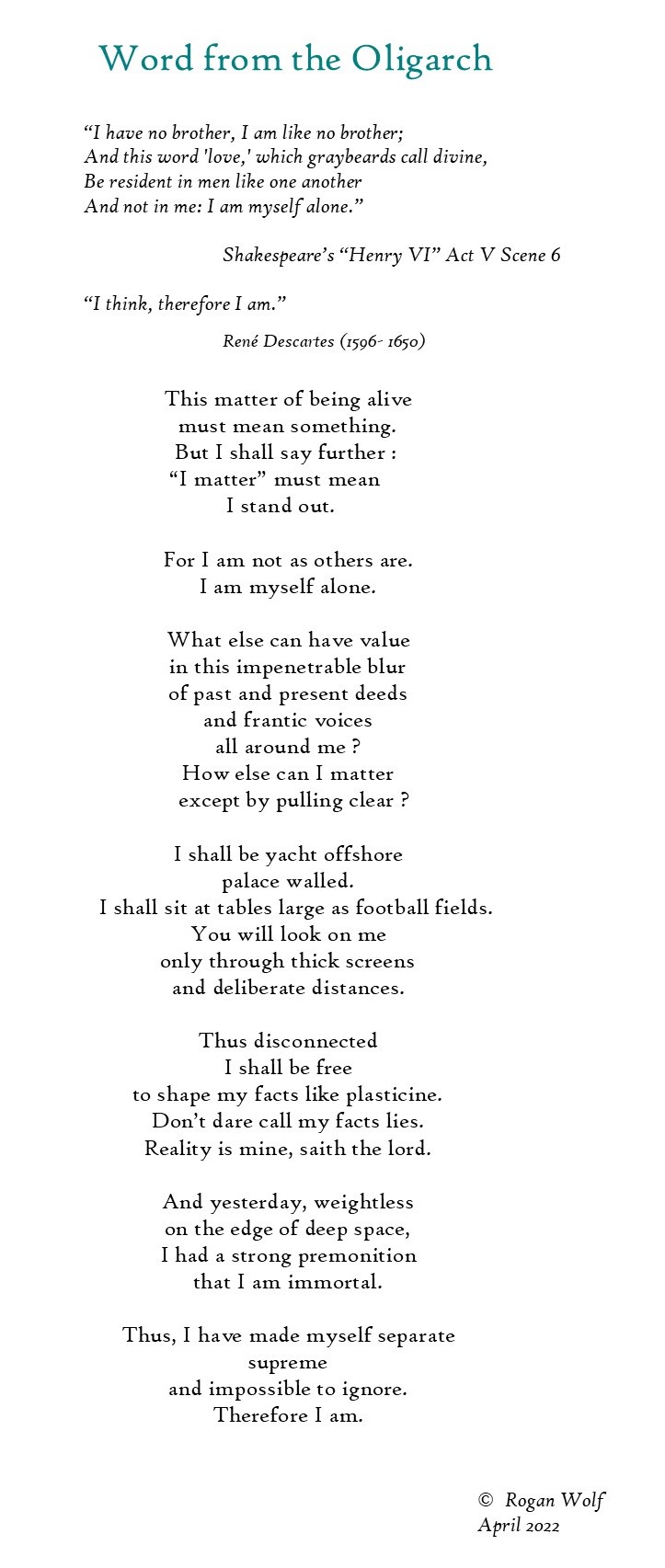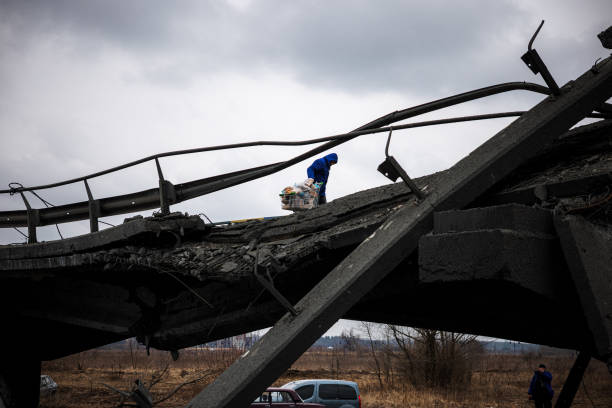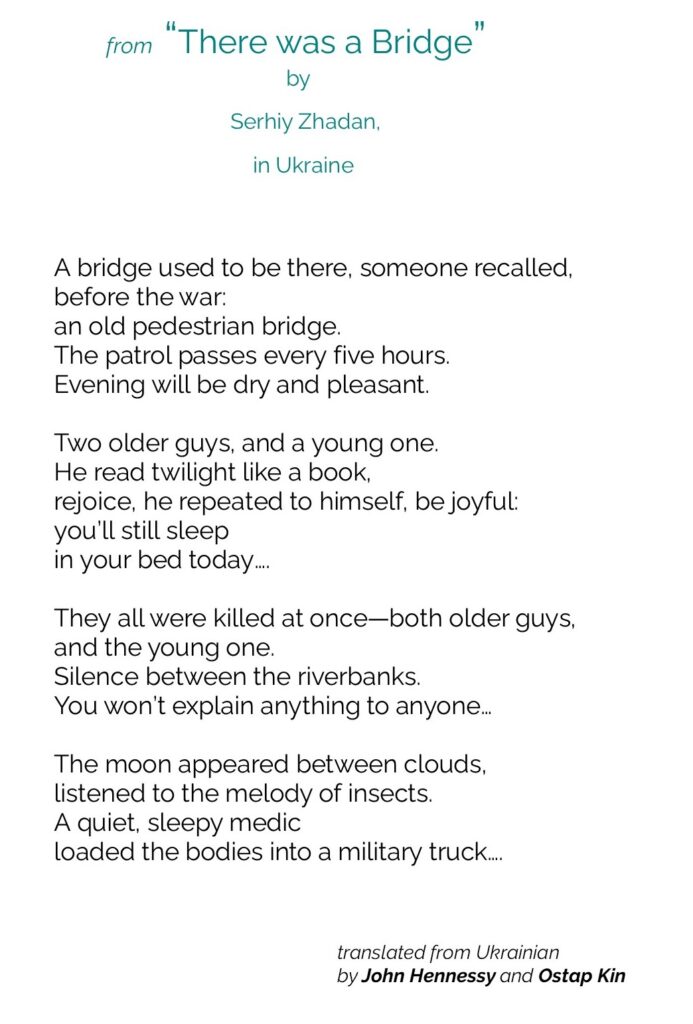
Footnote : The words at the head of this poem, from Shakespeare’s play Henry VI, are spoken by the man about to become Richard III. In the play, he has just finished murdering the rightful king, Henry VI.

Footnote : The words at the head of this poem, from Shakespeare’s play Henry VI, are spoken by the man about to become Richard III. In the play, he has just finished murdering the rightful king, Henry VI.
Posted:

Photograph by Dimitar Dilkoff : AFP via Getty Images

Reproduced by permission of the poet and translators. Find the translation of the whole poem here. The “Poems for…the wall” website has a bilingual version on its home page. It can be viewed (and downloaded from) here. Thanks to the PEN Ukraine team for helping in this.
Posted:

These days, a growing number of people are coming up with rude names for Mr Johnson, the UK Prime Minster. I too have a name for him which could be described as rude. But, in my case, I would argue that the reason I use this name is not just to vent my exasperation or express my contempt, although I have to admit that the man arouses both these feelings in me, very frequently. But, more importantly, I believe my name for him represents a real effort accurately to describe the way he is and how he behaves. I call him “The Hoodlum Toad.”
I have given him this name to draw out and to some extent give shape to the contrast between the sort of person we should be able to expect a nation’s leader to be – the qualities and behaviour that person is likely to display – and what we find instead in Mr Johnson.
I am not talking here from any particular position on the “political spectrum,” so called. I do not vote Tory, but that is no explanation or reason for naming Mr Johnson in the way I have. And I am not referring to Mr Johnson’s position on that spectrum, either (whatever that is, if any). I am talking about individual human qualities, things like character, motivation, skills, values.
Of course, a leader’s politics plays a part in how he or she is viewed, both by supporters and opponents. Opponents are likely to disagree more strongly, more frequently, with the philosophy, the policies, the approach.
But should not all of us be able to assume that – whatever our leader’s political views, whichever political party he or she belongs to, that person will be of good character and have high ability ? We owe it to ourselves, surely, to our own self-respect and to the wellbeing of everyone around us, to choose a leader whom we can trust and look up to, who will guide and represent our nation fittingly and wisely, and whom other national leaders will trust and respect. We need our leader to deserve and make meaningful that quaint-sounding address they still use in the Commons – “Right Honourable.” We need “Number Ten” to imply something better than just lockdown parties, grossly pretentious wall-paper, curiously acquired, and an endless stream of transparent toadie lies and evasions. Where has true “Right Honourable” gone ? We need to revive it. The real thing, in real practice.
“Hoodlum Toad” is a pun of course. Deliberately, it implies and refers to a vivid common phrase – “lying toad.” It also reminds me of a children’s book called “Wind in the Willows” by Kenneth Grahame. This was written and is set in Edwardian England and Mr Toad of Toad Hall, one of its main characters, is gentry. There is no mention of where he was schooled, but Eton is a safe bet. He is vain and irresponsible and brings shame on his family and friends. He spends a great deal of time making self-congratulatory speeches in front of his mirror, he crashes fast cars and, at least for a while, gets away with being impossible. Then, quite rightly, he’s locked up. Then he escapes. And so on and so forth.
For me, all of this describes Mr Johnson almost perfectly, with his extraordinary work record of twice being sacked for lying, his manner of gleeful, smirking roguishness and chaotic appearance and approach, even while being unashamedly old school “posh”, intolerant, unrestrained and autocratic. This is really who he is. “Hoodlum Toad” is Mr Johnson’s true name, almost all the others being simply masks, especially that puerile, self-serving and self-proclaimed “Boris” – as in “Call me Boris, smirk, scratch.” In assenting to join him in that joke of a name, we step into his cave, we disappear into his shadow. There, Kermit the Frog lurks with Peppa Pig, and a toy tractor “gets it done” by bursting through some bloated “world-beating” plastic bricks.
To name Mr Johnson “Hoodlum Toad” is to witness to the fact that he doesn’t know, perhaps has never learnt, how to speak on behalf of Truth to his neighbours, colleagues, fellow-citizens, above all to himself. Detached from human conscience, he speaks only truth-free sales-and-evasion talk, in endlessly hollow service to Self, seeking to win people over through trickery. And there is no end, or further purpose, by which to justify this forked and hissing form of address. The Toad’s own hollow Self is his end, his only and entire end. It is what he lives for. He worships it. Around him at all times, inevitably, there is chaos and ruin.
Posted:

Posted: